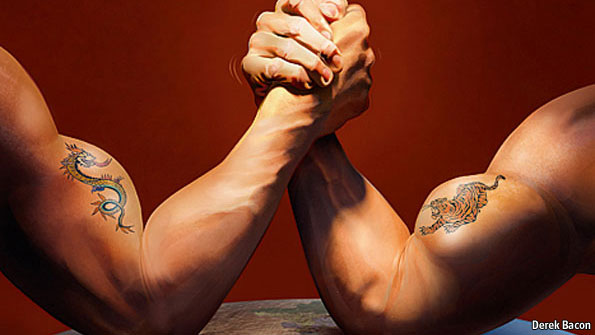The clash of the titans, according to The Economist
 Tuesday, September 7, 2010 at 12:09AM
Tuesday, September 7, 2010 at 12:09AM 
Economist editorial and briefing on the Indian-Chinese economic rivalry.
Unlike the rising tandem of Japan and Germany a century ago, India and China are akin to entire civilizations and not mere nation-states. They are also overwhelming poor, despite the booming economies.
And yet, how these two handle their twin rise will likely determine, says The Economist, whether or not great-power warfare returns to the scene.
Neither seems comfortable in their skin, says the editorial.
China, for example, gets resentment whenever it's told it needs to do more for the world. And yet, how not to involve the world's most populous state, biggest exporter, biggest car market, biggest carbon emitter and biggest consumer of energy?
India's paranoia tends to run toward the Chinese directly: they see China, at every possible point, trying to undermine its rise by locking in resources the world over, keeping it from a permanent UN Security Council seat, challenging its desired naval supremacy in the Indian Ocean, and the like. Then, of course, the last time they fought, in the early 1960s high up in the Himalayans, India fared badly.
From the outside, the Indians seem the better Western partner: its interests do not threaten the West and its long-term prospects seem brighter than China's (would you rather lose 100m workers by 2050 or add 300m?).
For now, only the hyper-nationalists on both sides dream of war between these two rising giants. Trade, meanwhile, has increased 230-fold since 1990 to a rough $60B this year (although decidedly favoring the Chinese, who, like in so many bilateral relationships, import raw materials from India while sending back finished goods). The leadership on both sides seems keenly aware that any fight between the two would likely derail both nation's rise. Still, both are nuclear powers and, between them, have 4m men in uniform, and share a disputed 4,000km border that includes the restive Tibet. But no confirmed shots in anger since 1967.
China's hubris of recent years has been expressed in its quiet but aggressive development of infrastructure along the disputed line, to include the permanent stationing of a lot more troops. India pledges to match that effort.
And yet, this is the system America created: an international liberal trade order that's easy to join and hard to dominate or overthrow, so if India and China continue to rise peacefully, despite all the trappings of power that would suggest the high probability of conflict, then our system is much to be credited, because we're doing what the British colonial order was never able to accomplish--peacefully integrate rising great powers.
My take remains the same: if you get Chinese partnership, it's hard for India to remain outside the larger, resulting process, but if you try the same with India, you get a far more stubborn China. And yet, a certain amount of hedging is called for until China becomes something far more pluralistic in its politics. Simply put, we don't fear rising democracies, only rising authoritarian states.










Reader Comments (1)
Everything Old Seems New Again. Soon after JFK was elected I was part of an Air Force mobility team being sent to India because China was sending troops up mountains next to Indian camps with limited logistics. We got on the transport plane which then stopped and returned to terminal. Another team would take that job. We then moved California Marines for an Eastern deployment, and then went to Florida. That night JFK went on TV to tell us about the Cuban missile crisis.
So, the real problem for this repeated India-China game is that it could distract current Core nations from real, unnoticed crises from irrational risk takers. This time it might be from a Korean or Iranian guy.